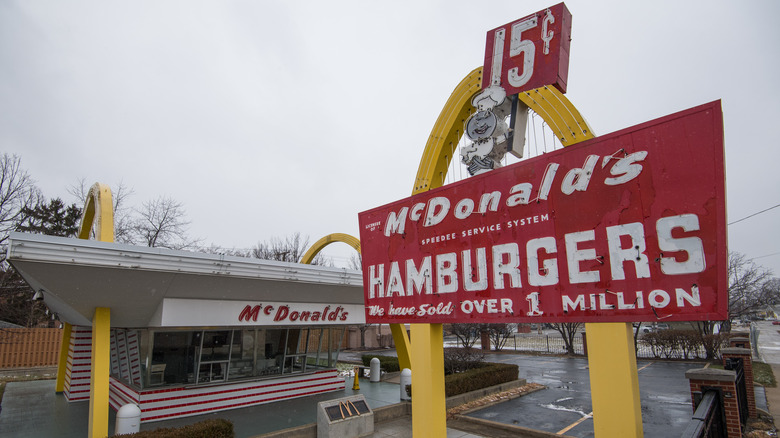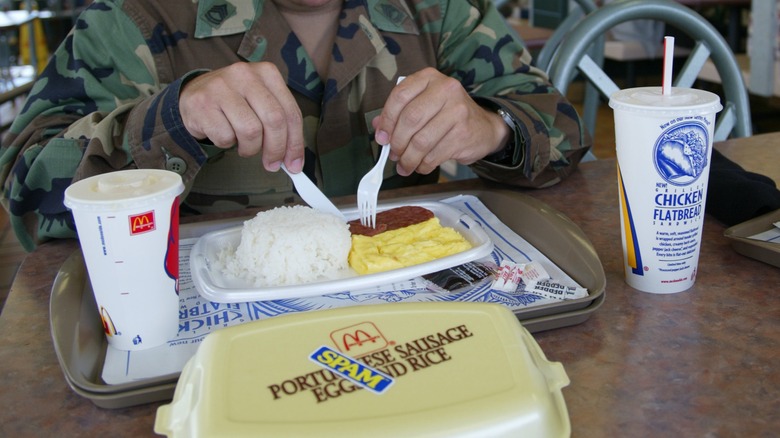Everyone who has seen “Pulp Fiction” knows that it is the little differences that make a trip to Europe so special, thanks to hitman Vincent Vega (played by John Travolta) waxing lyrical about buying a beer in a Parisian McDonald’s and French menu items like the “Royale with Cheese” and “Le Big Mac.” Likewise, Emmy-award-nominee actor Alexandra Daddario (seen on “The White Lotus”) and travel enthusiast revealed in an interview with Travel + Leisure that she loves experiencing these culinary quirks of the fast food kind whenever she heads abroad.
“I think travel really opens your eyes up to all the magic that’s in the world, and you get to try new food and have fun,” she told the publication but admitted that it was a chain from much closer to home that always made her must-do list: Checking out the regional options at international branches of McDonald’s.
As of 2022, the chain operated over 40,000 restaurants in more than 100 countriesranging from Azerbaijan to Venezuela, and incorporated some of the weirdest McDonald’s locations in the world. For many people, eating at one of its outlets is a taste of America, but regular classics like the Big Mac are often accompanied by menu items geared toward local tastes. Let’s take a look at how the franchise grew to global domination and some of those unusual but delicious regional dishes.
How Ronald McDonald conquered the world

McDonald’s began when brothers Dick and Mac McDonald started a drive-thru service selling 15-cent burgers in 1948. The first sit-down restaurant followed in 1955 in Des Plaines, Illinois, and by the end of the following decade, there were more than 1,000 outlets across the United States. In 1967, the chain made steps towards becoming a global franchise when the first international outlets opened in British Columbia and Costa Rica.
Worldwide expansion continued apace over the next few decades, with Ronald McDonald (introduced in 1963) conquering one continent at a time: Europe, Asia, and Oceania fell under his spell in 1971, with branches opening in Zaandam, Netherlands, and Sydney. South America followed in 1979 with a restaurant in Rio de Janeiro, and Africa in 1992 with a branch in Casablanca, Morocco. So far, there is no McDonald’s in Antarctica, and the franchise missed a trick when competitor Pizza Hut became the first fast food company to deliver to the International Space Station.
A new McDonald’s can even have geopolitical implications, and the greatest indication of the franchise’s global appeal came in 1990 when Moscow received its first branch. The event made international news as eager Russians queued for over six hours to sample delicacies from the country’s Capitalist foe, and the arrival of the Big Mac on Pushkinskaya Square was seen as a relaxation of Cold War antagonism as the Soviet Union faltered.
Unusual regional McDonald’s items around the globe

McDonald’s regional menu items are even a thing in the United States, ranging from the Crab Sandwich in Maryland and Virginia to fried cheese curds in Wisconsin. While a variation of the iconic Big Mac is available in every country that flips burgers under the Golden Arches, many global franchises also offer specific dishes that are tailor-made to the specific tastes of local diners.
India’s Maharaja Mac swaps beef for chicken on religious grounds and adds curry spices, while the McSpicy Paneer makes the most of the curd-like cheese, which is common in cooking on the subcontinent. In Asia, Singapore’s Samurai Burger adds an extra kick with teriyaki sauce, and Japan’s Gracoro Burger is a breaded combo of macaroni and white sauce. There is more pasta on the menu in the Philippines, where McSpaghetti makes a popular combo with fried chicken. Italian McDonald’s offers its version of Panzerotti, classic pastry pockets stuffed with mozzarella and tomato sauce, and you probably won’t be surprised to hear that Canadians can order Poutine at their branches.
Returning to regional tweaks in the United States, Alexandra Daddario cites the Hawaiian scrambled eggs with rice breakfast item as a highlight via Travel + Leisure, which you can also order with the island’s favorite processed meat, spam. Like Daddario and Vincent Vega attest, it’s the little differences that make arguably the world’s most recognizable fast food chain worth visiting while you’re on vacation.

